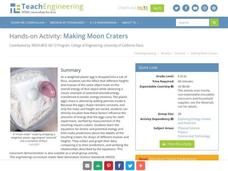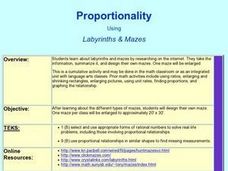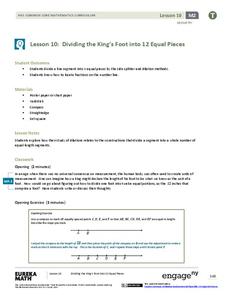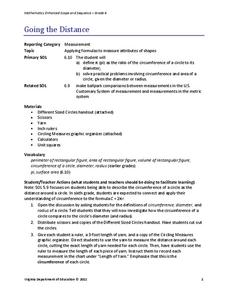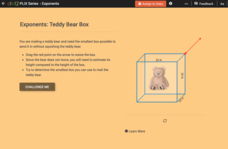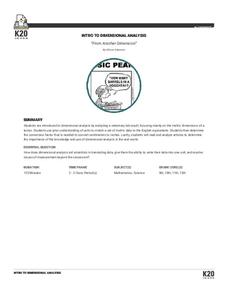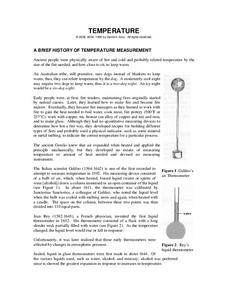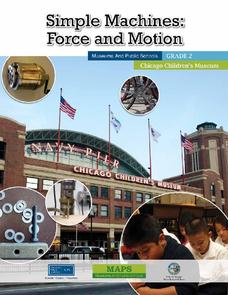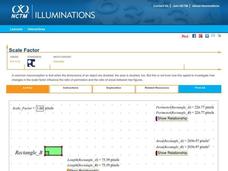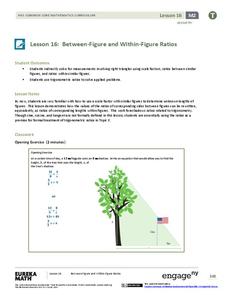PBS
Arguing over Area
With the help of the Area Officers and Perimeter Patrol, you learners will develop a better understanding of area and its relationship to perimeter. First, they view a video clip from Cyberchase, and then they visit a website to test...
Curated OER
Chemistry Midterm Practice Exam
A comprehensive practice exam, this resource covers many areas of chemistry. The test includes 71 multiple choice questions on topics such as problem solving, chemical equations, chemical formulas, thermodynamics, acids and bases, and...
Teach Engineering
Making Moon Craters
Create an egg-citing study of energy. Pupils investigate the effect of height and mass on the overall amount of energy of a falling object. The fourth segment in a six-part series on energy uses a weighted egg falling from different...
Curated OER
Proportionality Using Labyrinths and Mazes
Conduct research on the Internet about labyrinths and mazes to learn about proportions and ratios. Inquisitive minds design their own maze, one maze is chosen and proportionately enlarged to 20 feet by 30 feet. This is a fun challenge...
EngageNY
Dividing the King’s Foot into 12 Equal Pieces
Apply, apply, apply! A measurement lesson applies a number of concepts to help learn a new construction. Scholars learn to divide a segment into n equal parts using a method that uses the Side Splitter Theorem and a method that applies...
Virginia Department of Education
Going the Distance
Estimate the value of one of the most famous irrational numbers. The hands-on lesson plan instructs classmates to measure the circumference and diameters of circles using yarn. The ratio of these quantities defines pi.
CK-12 Foundation
Whole Number Exponents: Teddy Bear Box
Five questions—multiple-choice, fill in the blank, and discussion—make up an interactive that challenges scholars to mail a teddy bear using the smallest box possible without squishing it. A box with movable sides allows mathematicians...
Noyce Foundation
Parallelogram
Parallelograms are pairs of triangles all the way around. Pupils measure to determine the area and perimeter of a parallelogram. They then find the area of the tirangles formed by drawing a diagonal of the parallelogram and compare their...
Teach Engineering
Slinkies as Solenoids
What does an MRI machine have to do with a slinky? This activity challenges learners to run a current through a slinky and use a magnetic field sensor to measure the magnetic field. Groups then change the length of the slinky to see the...
K20 LEARN
From Another Dimension: Intro To Dimensional Analysis
Hold measurements to a different metric. Class members convert the measurements of a dog's tumor to explain the size to its owner. Using cards, learners match metric measurements with their English equivalents. They then read articles to...
Curated OER
Earthquakes: Fourth Grade Lesson Plans and Activities
Examine earthquake intensities and ways to measure an earthquake through the comparison of the Mercalli and Richter scales. After completing the pre-lab worksheet, fourth graders compare high and low intensity quakes by testing the...
Curated OER
Describing Data
Your learners will practice many ways of describing data using coordinate algebra in this unit written to address many Common Core State Standards. Simple examples of different ways to organize data are shared and then practice problems...
Chymist
Temperature
Three Dog Night isn't just the name of a band; it is also the way an Australian tribe, who used dogs to stay warm, would describe the temperature on a cool evening. After reading about many different ways of measuring temperature, the...
Curated OER
Simple Area of a Rectangle
These rectangles have everything scholars need to find the area, but none of them has units. Beginners to this skill multiply the length and width, all of which are whole numbers, to calculate and record the area for each. Consider...
Chicago Children's Museum
Simple Machines: Force and Motion
Get things moving with this elementary science unit on simple machines. Through a series of nine lessons including teacher demonstrations, hands-on activities, and science experiments, young scientists learn about forces, motion, and...
Illustrative Mathematics
How Thick Is a Soda Can I?
The humble soda can gets the geometric treatment in an activity that links math and science calculations. After a few basic assumptions are made and discussed, surface area calculations combine with density information to develop an...
Gatton Park
Magical Maths
A variety of activities take scholars outside the classroom to explore shapes, symmetry, measurement, patterns, sorting, and time in nature. Learners participate individually, and in teams, to measure found objects, go on a scavenger...
PBS
Working with Coordinate Planes: Assessments
It's time for scholars to show what they know about coordinate planes with a collection of three assessments. The exams' objectives include plotting points on a single grid, measuring using the distance formula, and identifying points on...
National Council of Teachers of Mathematics
Scale Factor
Does doubling mean everything doubles? Learners adjust the scale factor between two rectangles. Using the calculated measurements, pupils investigate the ratios between the lengths, perimeters, and areas of the rectangles.
Alabama Learning Exchange
Straight Line Motion
Students examine gravity, mass, and friction. In this speed and motion instructional activity, students investigate how straight line motion is impacted by gravity, mass, and fiction as they participate in a hands-on activity.
EngageNY
How Do Dilations Map Angles?
The key to understanding is making connections. Scholars explore angle dilations using properties of parallel lines. At completion, pupils prove that angles of a dilation preserve their original measure.
EngageNY
Between-Figure and Within-Figure Ratios
Tie the unit together and see concepts click in your young mathematicians' minds. Scholars apply the properties of similar triangles to find heights of objects. They concentrate on the proportions built with known measures and solve to...
Math Wire
Gingerbread Man Chain
Plan ahead with a holiday-themed math word problem. Pupils read a description of a gingerbread chain, including measurements and connections, and decide how long the chain should be to cover the top and bottom of a 72 inch bulletin board.
Teach Engineering
Ice, Ice, PV!
Knowing the temperature coefficient allows for the calculation of voltage output at any temperature. Groups conduct an experiment to determine the effects of temperature on the power output of a solar panel. The teams alter the...
Other popular searches
- Units Measurement
- Customary Units of Measurement
- Units of Measurement
- Nonstandard Measurement Units
- Si Units of Measurement
- Standard Units Measurement
- Arbitrary Units Measurement
- Standard Units of Measurement
- Converting Measurement Units
- Customary Units Measurement
- Historic Units of Measurement
- Linear Units of Measurement




